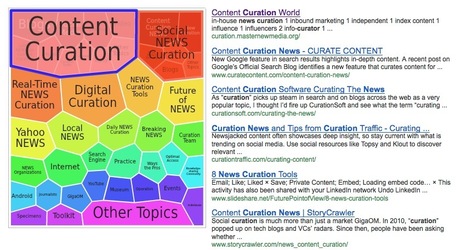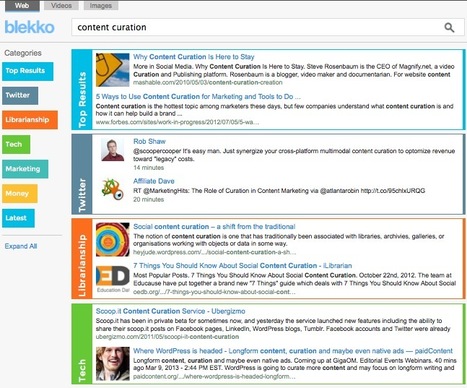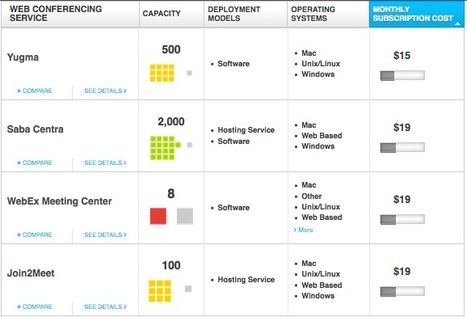"Inquiry that desires a deeper understanding and multiple points of view."
Get Started for FREE
Sign up with Facebook Sign up with X
I don't have a Facebook or a X account

 Your new post is loading... Your new post is loading...
 Your new post is loading... Your new post is loading...

Luigi Cappel's comment,
August 19, 2013 3:46 PM
Look forward to learning more about the solution for individuals

Katherine Hanson's comment,
August 30, 2013 10:08 AM
I completely agree, Harish - always has been, always will be

Raquel Oliveira's curator insight,
May 2, 2013 2:56 PM
Ferramenta para filtrar as informações relevantes da net e aprimorar a curadoria de conteúdo para fins de estudo ! Vale a consulta . |

Stephen Dale's curator insight,
January 17, 2014 11:28 AM
Looks like a useful - and free to use - resource for the commited data analyst/researcher.

Fernando Zamith's curator insight,
June 3, 2013 8:27 AM
O Google já tem substituto: Blekko. Os media sociais e a curadoria ao serviço da pesquisa (e vice-versa). Resultados de pesquisas adaptados ao tamanho do monitor que estamos a usar e organizados por categorias de diferentes cores. Muitos anos e muitos milhões de dólares depois, o Blekko está pronto para ser o motor de busca de referência. Experimentem! Vale a pena! 
Alejandro Tortolini's curator insight,
June 3, 2013 5:11 PM
Blekko agrupa visualmente las búsquedas de contenido. |















"Wonder was built to bring human-centric guidance back to the pursuit of knowledge on the web."
in other words: "Away from algorithmically sorted lists of links, and back to human-guided curation, evaluation and advice for those who don't need just a store address on a map".
Wonder is a new free web service which touts to be your online personal research assistant. Behind its minimalist website there's a crew of human beings that actually goes out to gather and bring back to you valuable answers and resources to your questions.
How does it work?
You just register via FB, Twitter or with your own email and then you are presented with a very simple screen in which you are asked "what are you wondering"?
You type in a question, and within a very reasonable amount of time (in my cases, in always less than 30 minutes) you receive a hand written email answer by a person with a first and last name. Not only. The person provides you also with multiple links to relevant resources that can help you find out and discover more about the topic of your interest.
Why it's relevant: Independently of the quality of the results that Wonder may initially bring to you, this new service highlights a growing trend toward trusted guides, expert curators of information, and their human voice and away from algorithmically sorted list of results like Google offers.
P.S.: In my initial tests a reply for a very specific question in one of my areas of expertise didn't bring back particularly valuable or useful suggestions as this knowledge would require an expert in the field, but less specialistic questions brought back useful responses written in a very human-style and supported by very high-quality relevant links and resources.
Here is one such question - answer as an example for you:
My Research Request:
How can I trust the answers provided by those behind Wonder if I know nothing about who they are?
Mike Smith reply:
Let me assure you, I am no robot. The resources curated by Wonder are compiled and collated by real human beings (such as myself) who take the time to sort through the vast amount of information available on the web.
I view the task of the Wonder researcher as being rather similar to that of your local librarian. And any good librarian isn't going to tell you how to think: they will present you with what knowledge and information they have available and arrange it in such a way that you must come to your own conclusion. Do you demand the librarian's credentials? Do you peruse their degrees and certifications? No, because her/his credentials lie in the quality of the work they have laid before you. Even if you detect bias or prejudice in what has been presented to you, then the curator's task has already been accomplished: you have assessed, for yourself, the quality of the information you have encountered and have honed your critical faculties that much more.
View Research
- Content curation (i.e. Wonder) is similar to consulting a librarian for literature on a particular subject
- Content curators (e.g. librarians) have empirically improved critical thinking skills in students
- Content curators (e.g. librarians) are tasked with fostering critical thinking in the evaluation of information sources
This is the future in preview.
Try it out and see what you think of it.
Free to use.
Try it out now: https://wonderlib.com/